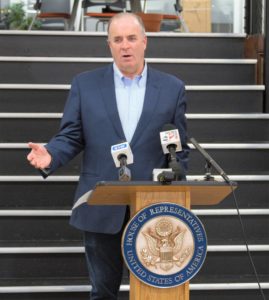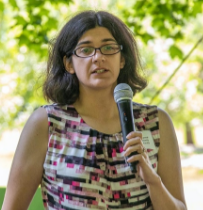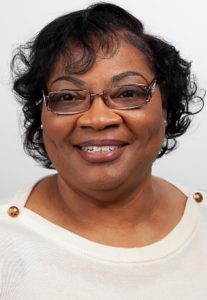By Jan Worth-Nelson
As the U.S. Senate was voting to approve the American Jobs Plan 69-30 Tuesday morning, with 19 Republicans joining all Democrats, a group of Genesee County activists from environmental justice, health care, and education spoke out forcefully to U.S. Representative Dan Kildee(MI-5) in a zoom webinar about the $1 trillion plan now on its way to the House of Representatives.

U.S. Representative Dan Kildee speaking at a press conference downtown Flint in January 2021. (Photo by Tom Travis)
The roundtable, organized by the activist coalition Michigan United via Flint pastor Monica Villareal, was moderated by East Village Magazine (EVM) political commentator Paul Rozycki.
The panel also addressed the need for elements of the upcoming proposed $3.5 trillion American Families Act, which would hugely expand the definition of “infrastructure” to include issues of child care, family support, education, climate change and health care.
In introductory remarks, Kildee confessed to “being frustrated” about how long it is taking to get crucial relief and progress on infrastructure and equity issues. While acknowledging that “we can’t have everything we want,” he said improvements in infrastructure, health care, environmental justice and education assistance to low- and middle-class families, “can’t wait another generation.”

Pastor Monica Villareal, Salem Lutheran Church, Flint (Photo source: MSU School of Social Work)
In written remarks delivered by Villareal, Kettering University professor Ben Pauli, also from the Environmental Transformation Movement of Flint, said Flint “set the fire that said infrastructure is needed” to the nation, noting that “We deeply understand the impact of environmental injustice on a community.
“Flint is ground zero of the American infrastructure crisis,” Pauli stated. “The contamination of Flint’s water was a tragic reminder of how woeful our failure has been to invest in the fabric of our civilization—the pipes, the roads, the bridges, the wires and cables that sustain us. And more often than not, when infrastructure fails it is our most vulnerable communities that pay the highest price.

Dr. Ben Pauli, Professor of Social Science at Kettering University. (Photo source: Kettering University)
“We have to make sure these bills will help the people who need it most,” asserted Nayyirah Shariff, representing the activist group Flint Rising. She argued funds delivered especially to lower-income communities should be grants, not loans. And she said this is an urgent moment, and that “collectively we can’t have communities slow-walking” actions to improve health care.

Flint water activist and director of Flint Rising Nayyirah Shariff. (Photo source: Nayyirah Shariff)
That position echoed throughout all the comments, with Mona Monroe-Younis from the Environmental Transformation Movement of Flint calling for urgent short term relief, but also for a long term plan, a “launching pad” to reorient the whole economy toward environmental justice, addressing “where we need to be 50 years out.”
That reorientation must include “green” considerations, she said, including finding ways to employ residents in communities of color to build solar panels, making better use of brownfields, modernizing “incredibly energy inefficient” school buildings, and retrofitting homes to reduce residents’ energy costs.
One urgent example of the way communities of color face disproportionate environmental challenges is a pending proposal for an asphalt manufacturing complex on a brownfield on Carpenter Road. She said environmental justice activists and community members are trying to stop it, noting public comment to the state Environmental Great Lakes and Energy department (EGLE) on the proposal closes Monday.
“We don’t want to have polluting facilities moving in in the name of progress,” she warned.
Monroe-Younis also called for attention to colleges and universities, asserting they must become “actively anti-racist institutions,” adding, “It’s not enough to ay you are not racist,” and that policies that perpetuate racist policies need to be rooted out.
Monroe-Younis advocated improvements in broadband access for low-income communities which have faced ongoing difficulties getting into the technology mainstream to open doors to crucial information and resources.
Yvonne Lewis, representing the National Center for African American Health Consciousness and the Healthy Flint Research Coordinating Center, noted that African Americans have suffered disproportionately from many of society’s ills, particularly when it comes to health care.

Yvonne Lewis, representing the National Center for African American Health Consciousness and the Healthy Flint Research Coordinating Center. (Photo source: www.ncaahc.com)
She asserted that, as is indicated by the World Health Organization (WHO), health is “more than the absence of disease,” adding that “We have to be clear that everything we do will have an impact on people’s health,” and issued a call for the society to invest in research and science. The overriding focus, she asserted, should be on “how we can best ensure that everybody has access to equitable and quality health care.”
Adrian Walker, from the Flint and Genesee Group and also a new board member of the Flint Community School district, called for beefed up high school programs and apprenticeship options creating opportunities for good-paying jobs to “reskill or upskill” youth and members of the workforce, putting “equity at the forefront of whatever bill is passed.”
He emphasized the bill must strengthen the pipeline to good-paying work for women and minorities, “changing the future of workforce development.”
Immigration attorney Victoria Arteaga pleaded for the bill to take into account the immigrant and undocumented communities, noting that the undocumented population has been left out of many benefits of the COVID-19 relief plan and that many undocumented families, including up to a million children, have faced obstacles to food assistance.
Perhaps most passionate in detailing the urgency of implementing the pending plans and effects of years of under-resourced public education on children and on a culture of racism was Joyce McNeal, a Flint Community Schools board member,
Lamenting the “interruptions of the Trump era” in bringing progress for public education and minorities and low-income children, she said it is past time to “get things right.”
“How can we send kids to school for 12 years and at the end of it they can’t read at the third grade level?” she said. “How do I know that my kid will be safe?” It is disrespectful, she said.
And for that matter, she asserted, “How do I know that I can get to Point A to Point B without being pulled over?…I am tired of not being heard, I am tired of being disrespected.”
“Water infrastructure has been especially neglected,” Pauli further noted in his written remarks. “Many of our water systems are at the end of their lifespans, but the cities that own and operate them don’t have the resources to replace them, even when public health is at risk. The American Jobs Plan proposes to make the largest investment in clean drinking water in American history, and Flint played no small part in making that happen.
“Even as we welcome this development, however, we must be honest about the scope of the challenges we face. While the American Jobs Plan proposes $45 billion for lead service line removal, for example, by some estimates it will take as much as $60 billion to replace all lead lines nationwide, and the bipartisan infrastructure plan will make only $15 billion available. We in Flint know how complicated and costly lead service line replacement can be, and how critical it is that federal investment reflect this reality.
“We know that every dilapidated and dangerous pipe we can take out of the ground is one less risk we have to live with, ” Pauli said.
He concluded, “With the legislation pending in Congress, we are on the verge of making a large down payment on the health and peace of mind of those who are living in fear of what will come out of their taps. But we also know that the fight for clean, safe drinking water will go on in our community–and in other communities–beyond the passage of this bill, and we hope that our federal allies and advocates will be with us for the long haul.”
EVM Consulting Editor Jan Worth-Nelson can be reached at janworth1118@gmail.com.


You must be logged in to post a comment.